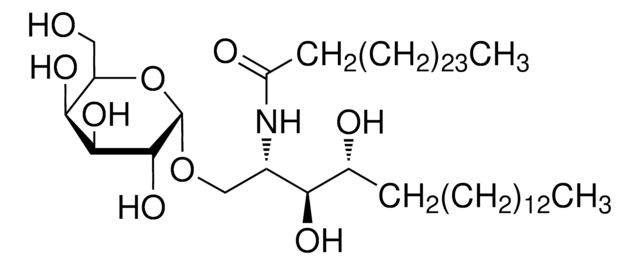860533P
Avanti
C16 Ceramide-1-Phosphate (d18:1/16:0)
Avanti Research™ - A Croda Brand 860533P, powder
Synonym(s):
N-palmitoyl-ceramide-1-phosphate (ammonium salt)
Sign Into View Organizational & Contract Pricing
All Photos(1)
About This Item
Empirical Formula (Hill Notation):
C34H71N2O6P
CAS Number:
Molecular Weight:
634.91
UNSPSC Code:
12352211
NACRES:
NA.25
Recommended Products
form
powder
packaging
pkg of 1 × 1 mg (860533P-1mg)
manufacturer/tradename
Avanti Research™ - A Croda Brand 860533P
lipid type
sphingolipids
shipped in
dry ice
storage temp.
−20°C
SMILES string
[H][C@](/C=C/CCCCCCCCCCCCC)(O)[C@@]([H])(NC(CCCCCCCCCCCCCCC)=O)COP([O-])(O)=O.[NH4+]
General description
C16 Ceramide-1-Phosphate (d18:1/16:0) or N-palmitoyl-ceramide-1-phosphate is a natural long chain ceramide.
Application
C16 Ceramide-1-Phosphate (d18:1/16:0) or N-palmitoyl-ceramide-1-phosphate has been used in lipid preparation to treat endothelial colony-forming cells (ECFCs) for nuclear morphology analysis. It has also been used as a bioactive lipid in cell migration assay to study its effects on multipotent stromal cell (MSCs) and human umbilical vein endothelial cells (HUVECs).
Packaging
5 mL Amber Glass Screw Cap Vial (860533P-1mg)
Legal Information
Avanti Research is a trademark of Avanti Polar Lipids, LLC
Storage Class Code
11 - Combustible Solids
Certificates of Analysis (COA)
Search for Certificates of Analysis (COA) by entering the products Lot/Batch Number. Lot and Batch Numbers can be found on a product’s label following the words ‘Lot’ or ‘Batch’.
Already Own This Product?
Find documentation for the products that you have recently purchased in the Document Library.
Customers Also Viewed
Chihwa Kim et al.
Stem cells (Dayton, Ohio), 31(3), 500-510 (2012-11-30)
Ceramide-1-phosphate (C1P) is a bioactive lipid that, in contrast to ceramide, is an antiapoptotic molecule released from cells that are damaged and "leaky." As reported recently, C1P promotes migration of hematopoietic cells. In this article, we tested the hypothesis that
Hebe Agustina Mena et al.
Arteriosclerosis, thrombosis, and vascular biology, 39(10), e219-e232 (2019-08-23)
Ceramide 1-phosphate (C1P) is a bioactive sphingolipid highly augmented in damaged tissues. Because of its abilities to stimulate migration of murine bone marrow-derived progenitor cells, it has been suggested that C1P might be involved in tissue regeneration. In the present
Antonio Gómez-Muñoz et al.
Journal of lipid research, 45(1), 99-105 (2003-10-03)
It was reported previously that ceramide-1-phosphate (Cer-1-P) is mitogenic for fibroblasts (Gómez-Muñoz, A., P. A. Duffy, A. Martin, L. O'Brien, H-S. Byun, R. Bittman, and D. N. Brindley. 1995. Mol. Pharmacol. 47: 883-889; Gómez-Muñoz, A., L. M. Frago, L. Alvarez
V T Hinkovska-Galcheva et al.
The Journal of biological chemistry, 273(50), 33203-33209 (1998-12-05)
Ceramide, a product of agonist-stimulated sphingomyelinase activation, is known to be generated during the phagocytosis of antibody-coated erythrocytes by polymorphonuclear leukocytes. Agonist-stimulated formation of ceramide-1-phosphate is now shown to occur in 32PO4-labeled neutrophils. Ceramide-1-phosphate is formed by a calcium-dependent ceramide
A Gomez-Muñoz et al.
Molecular pharmacology, 47(5), 833-839 (1995-05-01)
Ceramide and ceramide-1-phosphate are sphingolipid analogues of diacylglycerol and phosphatidate, respectively, and they are putative second messengers of agonist-stimulated sphingomyelin metabolism. The interactions of exogenous cell-permeable ceramides and ceramide-1-phosphates in modifying DNA synthesis and signal transduction were investigated in Rat-1
Our team of scientists has experience in all areas of research including Life Science, Material Science, Chemical Synthesis, Chromatography, Analytical and many others.
Contact Technical Service











